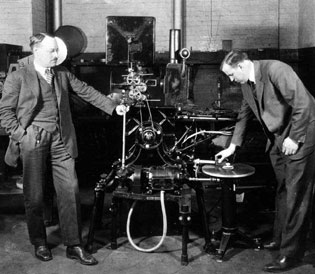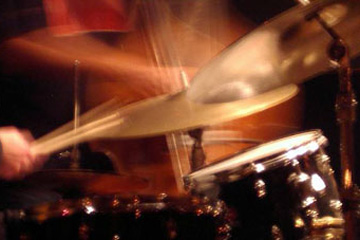|
|
The covers of this book are too far apart.
- Ambrose Bierce (1842-1914)
Today is Saturday - April 20th, 2024
On This Day In History:

1926 - First Motion Picture Sound
Western Electric and Warner Bros. announce Vitaphone, a process to add sound to film. The system logged sound on a record linked electronically to the projector, keeping sound synchronized with image.
Until the 1920s, any sound associated with motion pictures came either from live actors and musicians or from a phonograph, but by the early 1920s, several competing sound systems had developed. In 1923, inventor Lee de Forest demonstrated Phonofilm, the first film capable of taping sound. Music was recorded on a narrow strip at the edge of the film. De Forest's demonstration showed a man and woman dancing, four musicians playing instruments, and an Egyptian dancer, all accompanied by music but without dialogue. De Forest's system evolved into the Movietone sound process, introduced in 1927.
Meanwhile, competing systems like Vitaphone threatened to create a standards war in the industry. Fitting a movie theater for a sound system was extremely costly-to wire a movie house for Warner Bros.' Vitaphone sound system, for example, cost about $20,000.
Several studios, including MGM, Paramount, and Universal, agreed to wait to make talkies until they also agreed on a single audio standard, but Warner Bros., not part of the agreement, released the earliest sound films. For Warner Bros., then in difficult financial straights, sound was a matter of survival--the struggling company had staked everything it had on acquiring the Vitaphone system and publicizing its early sound movies. The first, Don Juan (1926), starring John Barrymore, featured sound but no dialogue. The following year, the studio released The Jazz Singer, which included music as well as about 350 words of dialogue. Only about 200 theaters nationwide were equipped for Warner Bros.' Vitaphone, so a silent version of the movie was also distributed. Sound caught on and revived Warner Bros.' fortunes.
The Vitaphone system, however, didn't last long. Synchronizing a recording with a film was less reliable than integrating the sound onto the film itself, so systems like Movietone quickly replaced Vitaphone. Additional developments improved sound quality over the decades, including the introduction of magnetic tape recording by 1950 and the stereophonic sound system later in the decade. Dolby Laboratories introduced a noise-reduction system that became popular in the late '70s, and digital sound systems added additional clarity and crispness to soundtracks in the early 1990s.
|
Celebrating Birthdays Today:
|
What Happened on Your Special Day?
I became a fan of "today in history" information when I was very young. My father had a calendar that he had put together of "reasons to celebrate". If anybody asked "what are we celebrating?" my father could check his book and come up with a reason to celebrate for any day of the year. Charlie Chaplin's birthday, Buster Keaton's birthday, the anniversary of the opening of the Golden Gate Bridge, for every day of the year, my father's calendar had some interesting historical event that had occurred.
With this page I have tried to continue the tradition. Generally, I prefer to include birthdays and anniversaries of positive, uplifting, life affirming people and events that have had particular significance in my life. It's here because it was important to me.
I am trying to continually update with links from stories to other relevant sites. Check back regularly for a story on something interesting that happened on this day in history.
There are many, many, sites out there that have a lot of "this day in history" information. Many are not so great, full of inaccurate information and "negative vibes". However, there are a few that are really fabulous. Here are links to a few of my favorites. These sites feature "Today in History" stories for today, and some include archives that will enable you to look up information for any other date in history that is special to you:
This Day in History
The History Channel tells you what happened in Automotive, Civil War, Cold War, Crime, Entertainment, General Interest, Literary, Old West, Vietnam War, Wall Street, and World War II history for today or any day.
Life Magazine Covers
Life offers a look at covers from this day in history.
New York Times: On This Day
Lists events which occurred on each month and day of the year throughout history. Links to New York Times articles on the events when available.
Today in History
Stories and pictures from the American Memory historical collections of the U.S. Library of Congress.
The Internet Movie Database
The Internet Movie Database claims itself to be the biggest, best, most award-winning movie site on the planet. I'm not sure if it really is, but it is huge and has TONS of info on even the most obscure films, movies stars, directors, producers, etc. If it is motion picture related, you can probably find out something about it at this site.
|
|





